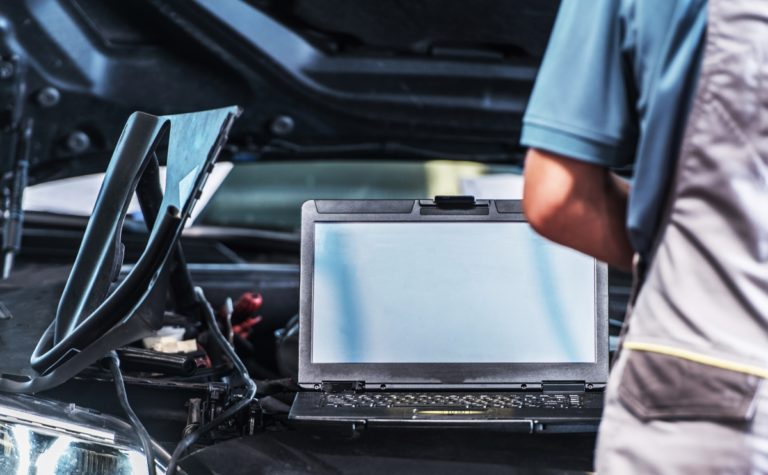This article originally appeared in The Salem News by Christian M. Wade.
BEVERLY — When Ron Jedraszek plugs into a vehicle’s computer system to diagnose a problem, the only thing he sees on the screen is numbers and codes.
The longtime owner of Park Street Auto in Beverly says that’s why he’s baffled by “misleading” TV ads opposing Question 1, a referendum set for the Nov. 3 ballot in Massachusetts.
The ads, part of a multimillion-dollar campaign backed by a coalition of auto makers, suggest sexual predators could more easily stalk victims if voters approve changes to the so-called “right to repair” law. One commercial shows a woman walking to her vehicle in an empty parking garage as the camera peers around a corner and follows her. Another shows a man walking up to a home and using a handheld remote to enter through the garage door.
“They’re trying to scare people,” said Jedraszek, who supports Question 1 and was featured in a recent TV ad backing the initiative. “The only information we get out of cars is sensor codes and other automotive repair stuff. We don’t have access to personal information.”
If approved, Question 1 would overhaul a 2013 state law requiring car companies to share diagnostic data with car owners and independent repair shops. The law requires automakers to provide access to their computer codes.
The “right to repair” coalition says the law needs updating because it unfairly allows automakers to use wireless technology to steer business toward dealerships, cutting out small shops and driving up consumer costs.
Opponents of Question 1 say the law already accounts for technological advances and doesn’t need revision. Far from being a David vs. Goliath battle, they say, the proposed changes are sought by the deep-pocketed retail auto parts industry looking to expand its share of the market.
“Question 1 has never been about repair, and it has never been about local repair shops,” said Conor Yunits, spokesperson for the No on 1 campaign and Coalition for Safe and Secure Data. “Question 1 is about national retail auto-parts suppliers who want your data so they can increase their profits for Wall Street investors.”
A key issue in the debate is whether expanded access to so-called “telematics” would risk the safety of car owners and cybersecurity.
Opponents of Question 1 claimed in a statewide voter guide to have support from Jane Doe Inc., an advocacy group for victims of sexual abuse, but the group is distancing itself from the ballot fight.
In a statement, Jane Doe said it “initially raised safety and privacy concerns” about the proposed changes, but further analysis showed the ballot initiative “does not appear to pose the heightened risk of breach of personal information as suggested by those who oppose this initiative.”
“We do not support the use of survivor fears or needs as pawns in a debate that is not ultimately about the needs of survivors,” the group added.
Supporters of the changes have enlisted former Boston police commissioner Ed Davis, who has blasted the opponents’ ads as a “dishonest fear campaign.”
Opponents have also pointed to testimony by the National Highway Traffic Safety Administration, which said the changes would force auto makers to redesign vehicles in a manner that “introduces cybersecurity risks.” Question 1 supporters say that testimony was based on proposed legislation, not the ballot question.
Both groups are spending heavily to convince voters ahead of the election, making it the most costly question on the ballot.
The Coalition for Safe and Secure Data, which opposes the changes, spent about half of the nearly $25 million it had raised as of Sept. 15, according to filings with the Office of Campaign and Political Finance.
Meanwhile, the Massachusetts Right to Repair Committee, which backs the update, had raised more than $15 million and spent $10.8 million.




